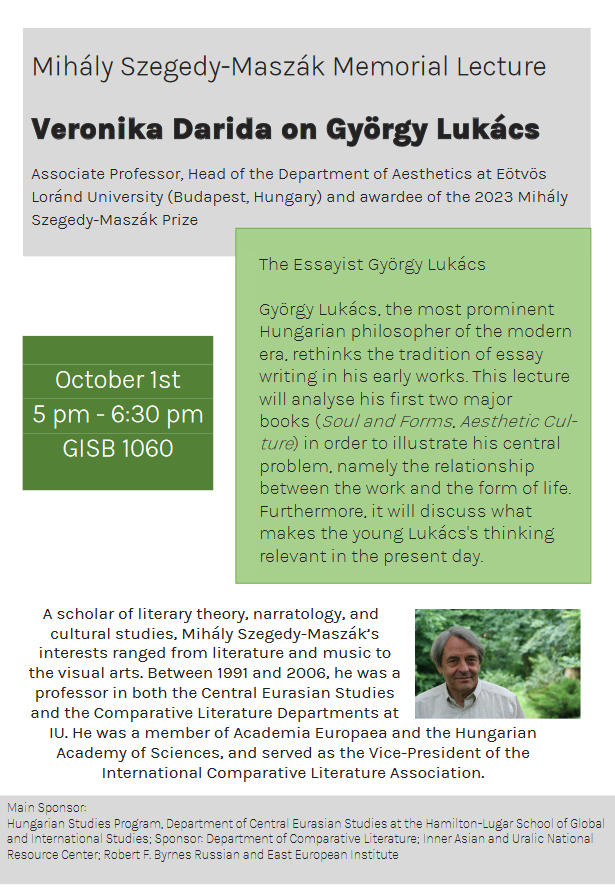On Tuesday, October 1st, 2024, the Hungarian Studies Program at the Department of Central Eurasian Studies, the Inner Asian and Uralic National Resource Center, the Robert F Byrnes Russian and East European Institute, and the Department of Comparative Literature welcomed Professor Veronika Darida via zoom to give a lecture on the early writings of controversial Hungarian philosopher and writer, Gyorgy Lukacs (1885-1971). The writer came from a wealthy Jewish family, and did not use his birthname when publishing his writings. Professor Darida wanted to focus on the philosopher’s early writings, as they are not as well-known as his later Marxist texts. She specified two books: Soul and Form (1910) and Aesthetic Culture (1913). These books feature texts which focus on the essay form, and the experimentation of the essay form for Lukacs. Prof. Darida showed how Lukacs takes meaning from his own life, and the essays become confessional literature. In particular, she argued, Soul and Form was innovative and experimental, but Lukacs spends much time “searching”. One event in his life that deeply affected his writing was the suicide of his love from his youth. In addition, Lukacs’ best friend, Leo Popper colored how he thought about the essay form, and its connection to art and science. Lukacs, Darida underscored, wrestled in these early books with the tension between life and the particular forms he was exploring. In the essays of Soul and Form, Lukacs questions how artistic expression can be a problem of life, and also how gestures can or cannot translate into poetry. This analysis of gesture connected deeply with his love’s suicide, as he saw her suicide as a gesture. Lukacs, Professor Darida argued, was also deeply concerned in his early writings with what he saw as the “aestheticism” of his current society, which he believed was concerned with “mood”. The presenter in addition showed how Lukacs’ most famous essay in Soul and Form, “The Metaphysis of Tragedy”, underscored the anarchy of life, but also portrayed tragedy as a moment and every life fulfillment as a miracle. Aesthetic Culture was written in the same time period as Soul and Form, and continued Lukacs’ concern with the culture of his time. He wrote that the aesthetic culture of his time, which focused on atmosphere and mood, was characterized by loneliness. Professor Darida emphasized how Lukacs’ essay “Parting of the Ways” shows him supporting new art which he believed was declaring war against the impressionistic art style. Darida also showcased how Lukacs in Aesthetic Culture used his own experience with grief to discuss a separation of life and work. In her conclusion, Professor Darida explained that Lukacs later viewed his early works with suspicion and judged them to be useless. However, she argued that these early works are interesting because they leave an impression and are experimental. The audience during question time pointed out that later Lukacs would be involved in executions amongst his support of the government under the Soviet Union, which is why today his legacy is extremely controversial in Hungary. Darida also said that there is renewed interest in his works by the younger generation, especially because Lukacs is the most famous Hungarian philosopher. Towards the end of the question session, the audience and presenter considered the tension that this writer’s legacy has left.
Mihaly Szegedy-Maszak Memorial Lecture: Veronika Darida on Gyorgy Lukacs
Tuesday, October 01, 2024


